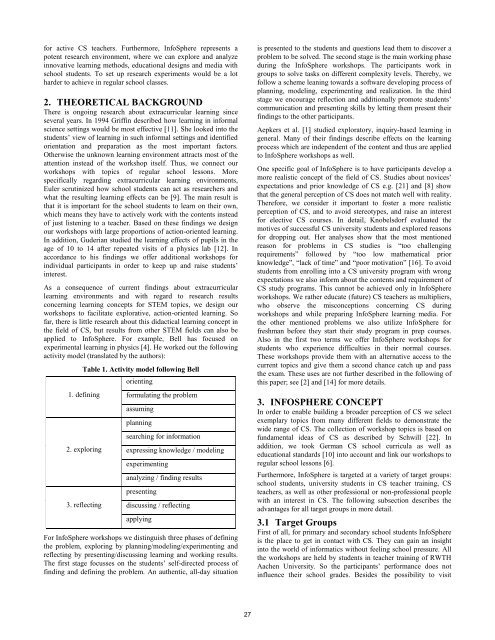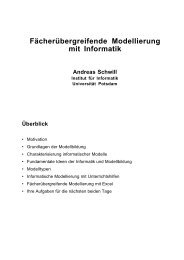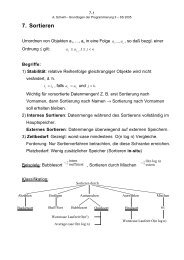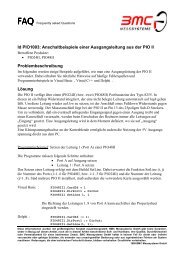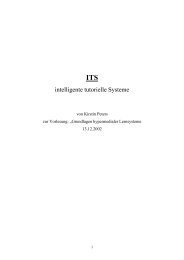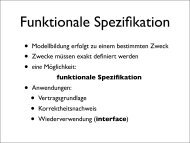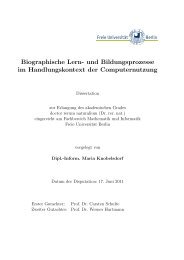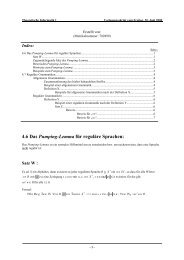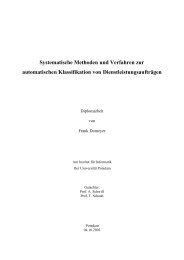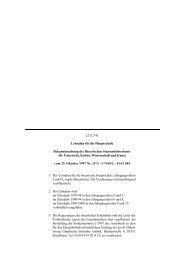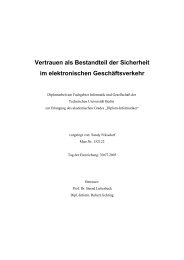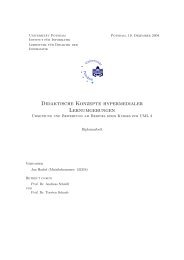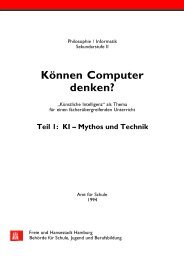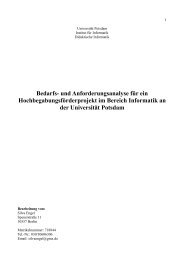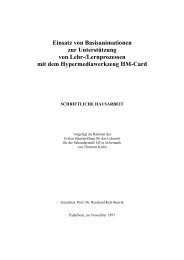Maria Knobelsdorf, University of Dortmund, Germany - Didaktik der ...
Maria Knobelsdorf, University of Dortmund, Germany - Didaktik der ...
Maria Knobelsdorf, University of Dortmund, Germany - Didaktik der ...
You also want an ePaper? Increase the reach of your titles
YUMPU automatically turns print PDFs into web optimized ePapers that Google loves.
for active CS teachers. Furthermore, InfoSphere represents a<br />
potent research environment, where we can explore and analyze<br />
innovative learning methods, educational designs and media with<br />
school students. To set up research experiments would be a lot<br />
har<strong>der</strong> to achieve in regular school classes.<br />
2. THEORETICAL BACKGROUND<br />
There is ongoing research about extracurricular learning since<br />
several years. In 1994 Griffin described how learning in informal<br />
science settings would be most effective [11]. She looked into the<br />
students’ view <strong>of</strong> learning in such informal settings and identified<br />
orientation and preparation as the most important factors.<br />
Otherwise the unknown learning environment attracts most <strong>of</strong> the<br />
attention instead <strong>of</strong> the workshop itself. Thus, we connect our<br />
workshops with topics <strong>of</strong> regular school lessons. More<br />
specifically regarding extracurricular learning environments,<br />
Euler scrutinized how school students can act as researchers and<br />
what the resulting learning effects can be [9]. The main result is<br />
that it is important for the school students to learn on their own,<br />
which means they have to actively work with the contents instead<br />
<strong>of</strong> just listening to a teacher. Based on these findings we design<br />
our workshops with large proportions <strong>of</strong> action-oriented learning.<br />
In addition, Gu<strong>der</strong>ian studied the learning effects <strong>of</strong> pupils in the<br />
age <strong>of</strong> 10 to 14 after repeated visits <strong>of</strong> a physics lab [12]. In<br />
accordance to his findings we <strong>of</strong>fer additional workshops for<br />
individual participants in or<strong>der</strong> to keep up and raise students’<br />
interest.<br />
As a consequence <strong>of</strong> current findings about extracurricular<br />
learning environments and with regard to research results<br />
concerning learning concepts for STEM topics, we design our<br />
workshops to facilitate explorative, action-oriented learning. So<br />
far, there is little research about this didactical learning concept in<br />
the field <strong>of</strong> CS, but results from other STEM fields can also be<br />
applied to InfoSphere. For example, Bell has focused on<br />
experimental learning in physics [4]. He worked out the following<br />
activity model (translated by the authors):<br />
Table 1. Activity model following Bell<br />
1. defining<br />
2. exploring<br />
3. reflecting<br />
orienting<br />
formulating the problem<br />
assuming<br />
planning<br />
searching for information<br />
expressing knowledge / modeling<br />
experimenting<br />
analyzing / finding results<br />
presenting<br />
discussing / reflecting<br />
applying<br />
For InfoSphere workshops we distinguish three phases <strong>of</strong> defining<br />
the problem, exploring by planning/modeling/experimenting and<br />
reflecting by presenting/discussing learning and working results.<br />
The first stage focusses on the students’ self-directed process <strong>of</strong><br />
finding and defining the problem. An authentic, all-day situation<br />
27<br />
is presented to the students and questions lead them to discover a<br />
problem to be solved. The second stage is the main working phase<br />
during the InfoSphere workshops. The participants work in<br />
groups to solve tasks on different complexity levels. Thereby, we<br />
follow a scheme leaning towards a s<strong>of</strong>tware developing process <strong>of</strong><br />
planning, modeling, experimenting and realization. In the third<br />
stage we encourage reflection and additionally promote students’<br />
communication and presenting skills by letting them present their<br />
findings to the other participants.<br />
Aepkers et al. [1] studied exploratory, inquiry-based learning in<br />
general. Many <strong>of</strong> their findings describe effects on the learning<br />
process which are independent <strong>of</strong> the content and thus are applied<br />
to InfoSphere workshops as well.<br />
One specific goal <strong>of</strong> InfoSphere is to have participants develop a<br />
more realistic concept <strong>of</strong> the field <strong>of</strong> CS. Studies about novices’<br />
expectations and prior knowledge <strong>of</strong> CS e.g. [21] and [8] show<br />
that the general perception <strong>of</strong> CS does not match well with reality.<br />
Therefore, we consi<strong>der</strong> it important to foster a more realistic<br />
perception <strong>of</strong> CS, and to avoid stereotypes, and raise an interest<br />
for elective CS courses. In detail, <strong>Knobelsdorf</strong> evaluated the<br />
motives <strong>of</strong> successful CS university students and explored reasons<br />
for dropping out. Her analyses show that the most mentioned<br />
reason for problems in CS studies is “too challenging<br />
requirements” followed by “too low mathematical prior<br />
knowledge”, “lack <strong>of</strong> time” and “poor motivation” [16]. To avoid<br />
students from enrolling into a CS university program with wrong<br />
expectations we also inform about the contents and requirement <strong>of</strong><br />
CS study programs. This cannot be achieved only in InfoSphere<br />
workshops. We rather educate (future) CS teachers as multipliers,<br />
who observe the misconceptions concerning CS during<br />
workshops and while preparing InfoSphere learning media. For<br />
the other mentioned problems we also utilize InfoSphere for<br />
freshman before they start their study program in prep courses.<br />
Also in the first two terms we <strong>of</strong>fer InfoSphere workshops for<br />
students who experience difficulties in their normal courses.<br />
These workshops provide them with an alternative access to the<br />
current topics and give them a second chance catch up and pass<br />
the exam. These uses are not further described in the following <strong>of</strong><br />
this paper; see [2] and [14] for more details.<br />
3. INFOSPHERE CONCEPT<br />
In or<strong>der</strong> to enable building a broa<strong>der</strong> perception <strong>of</strong> CS we select<br />
exemplary topics from many different fields to demonstrate the<br />
wide range <strong>of</strong> CS. The collection <strong>of</strong> workshop topics is based on<br />
fundamental ideas <strong>of</strong> CS as described by Schwill [22]. In<br />
addition, we took German CS school curricula as well as<br />
educational standards [10] into account and link our workshops to<br />
regular school lessons [6].<br />
Furthermore, InfoSphere is targeted at a variety <strong>of</strong> target groups:<br />
school students, university students in CS teacher training, CS<br />
teachers, as well as other pr<strong>of</strong>essional or non-pr<strong>of</strong>essional people<br />
with an interest in CS. The following subsection describes the<br />
advantages for all target groups in more detail.<br />
3.1 Target Groups<br />
First <strong>of</strong> all, for primary and secondary school students InfoSphere<br />
is the place to get in contact with CS. They can gain an insight<br />
into the world <strong>of</strong> informatics without feeling school pressure. All<br />
the workshops are held by students in teacher training <strong>of</strong> RWTH<br />
Aachen <strong>University</strong>. So the participants’ performance does not<br />
influence their school grades. Besides the possibility to visit


